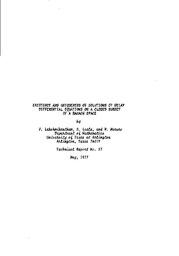| dc.description.abstract | **Please note that the full text is embargoed** ABSTRACT: In an earlier work [5], sufficient conditions for the existence of solutions in a closed subset F of a Banach space E for the Cauchy problem
(1.1) [see pdf for notation]
where [see pdf for notation],
are obtained by requiring f to satisfy (i) a compactness-type condition in terms of the Kuratowski measure of noncompactness and (ii) a boundary condition, namely,
(1.2) [see pdf for notation]
for every [see pdf for notation]. In this paper, we wish to explore the other direction followed in the study of the Cauchy problem for differential equations in a Banach space [4,6,7], that is, finding dissipative type conditions which assure the existence as well as the uniqueness of solutions in F for the Cauchy problem (1,1). In [3], the existence and uniqueness of solutions of (1.1) has been proved in an open set when the
function f satisfies a simple dissipative-type condition over a suitable subset of its domain.
In Section 4, we show (Theorem 4.3) that when the boundary condition (1.2) is satisfied and f satisfies a Lipschitz type condition in terms of a comparison function of the form [see pdf for notation], the existence and uniqueness of solutions of (1.1) in F is established by making use of comparison theorems involving functional differential
inequalities. Also, if the closed set F is assumed to be convex, the dissipative condition on f can be weakened by imposing, as in [3], that it has to be satisfied only over a suitable subset of the domain of f (see Theorem 4.1).
One may also be interested in determining the existence and uniqueness of solutions of (1.1) when the initial function [see pdf for notation] is such that [see pdf for notation] for every [see pdf for notation]. In this case, in general, it is not enough to require that (1.2) be satisfied only for such functions, as the counterexample given in [5] shows. But, if we assume that (1.2) is satisfied for [see pdf for notation] and [see pdf for notation], where [see pdf for notation] is the closed convex hull of F, then the aforesaid dissipative-type condition assures the existence and uniqueness of solutions of (1.1) in
F, when .[see pdf for notation]. Thus, the result obtained by Seifert in [8, Theorem 2] for delay differential equations in [see pdf for notation], can be generalized in two different ways when the delay is constant, namely, either by eliminating the convexity hypothesis on F or by relaxing the dissipative condition.
The problem of proving an existence and uniqueness result when the set F is not convex and f satisfies a general dissipative-type condition in terms of a Lyapunov-like function presents several difficulties,
as in the case of differential equations without delay [3,5]. In Section 5, we show (Lemma 5.2) that if (a) f satisfies a dissipative-type condition in terms of a Lyapunov function belonging to a certain class, and
(b) the boundary condition (1.2) holds, we can construct certain auxiliary sequences of continuous functions which are in some sense close to the polygonal approximate solutions for the Cauchy problem (1.1) obtained in [5, Lemma 3]. Then, by employing a new comparison result (Lemma 5.3)
which involves a sequence of functions satisfying a certain functional differential inequality, we establish the existence and uniqueness of solutions of (1.1) in F.
3 | en |


